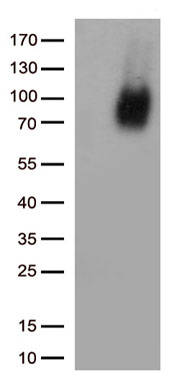CD133 (PROM1) Mouse Monoclonal Antibody [Clone ID: OTI5G10]
CAT#: CF813750
Carrier-free (BSA/glycerol-free) PROM1 mouse monoclonal antibody, clone OTI5G10
Size: 25 Slides
Frequently bought together (2)
Other products for "CD133"
Specifications
| Product Data | |
| Clone Name | OTI5G10 |
| Applications | FC, WB |
| Recommended Dilution | WB 1:1000, FLOW 1:100 |
| Reactivities | Human |
| Host | Mouse |
| Isotype | IgG2b |
| Clonality | Monoclonal |
| Immunogen | Full length human recombinant protein of human PROM1 (NP_006008) produced in HEK293T cell. |
| Formulation | Lyophilized powder (original buffer 1X PBS, pH 7.3, 8% trehalose) |
| Reconstitution Method | For reconstitution, we recommend adding 100uL distilled water to a final antibody concentration of about 1 mg/mL. To use this carrier-free antibody for conjugation experiment, we strongly recommend performing another round of desalting process. (OriGene recommends Zeba Spin Desalting Columns, 7KMWCO from Thermo Scientific) |
| Purification | Purified from mouse ascites fluids or tissue culture supernatant by affinity chromatography (protein A/G) |
| Conjugation | Unconjugated |
| Storage | Shipped at -20°C or with ice packs, Upon delivery store at -20°C. Dilute in PBS(pH7.3) if necessary. Stable for 12 months from date of receipt. Avoid repeated freeze-thaws. |
| Stability | Stable for 12 months from date of receipt. |
| Predicted Protein Size | 97 kDa |
| Gene Name | prominin 1 |
| Database Link | |
| Background | This gene encodes a pentaspan transmembrane glycoprotein. The protein localizes to membrane protrusions and is often expressed on adult stem cells, where it is thought to function in maintaining stem cell properties by suppressing differentiation. Mutations in this gene have been shown to result in retinitis pigmentosa and Stargardt disease. Expression of this gene is also associated with several types of cancer. This gene is expressed from at least five alternative promoters that are expressed in a tissue-dependent manner. Multiple transcript variants encoding different isoforms have been found for this gene. [provided by RefSeq, Mar 2009]. |
| Synonyms | AC133; CD133; CORD12; MCDR2; MSTP061; PROML1; RP41; STGD4 |
| Reference Data | |
| Protein Families | Druggable Genome, ES Cell Differentiation/IPS, Transmembrane |
Documents
| Product Manuals |
| FAQs |
| SDS |
Resources
| Antibody Resources |
{0} Product Review(s)
0 Product Review(s)
Submit review
Be the first one to submit a review
Product Citations
*Delivery time may vary from web posted schedule. Occasional delays may occur due to unforeseen
complexities in the preparation of your product. International customers may expect an additional 1-2 weeks
in shipping.






























































































































































































































































 Germany
Germany
 Japan
Japan
 United Kingdom
United Kingdom
 China
China









